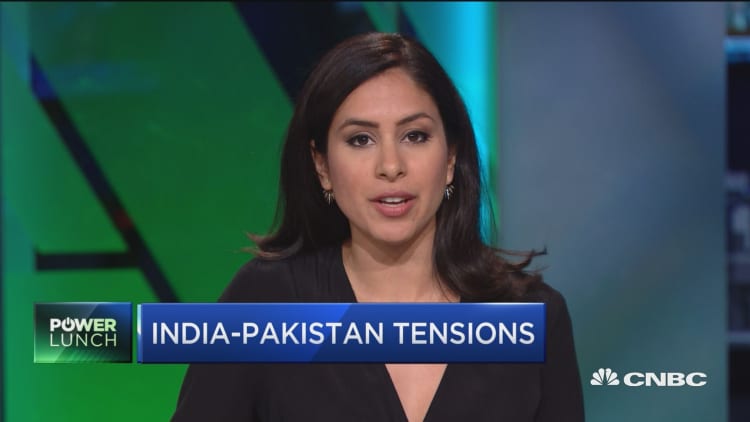
As the world's largest democracy gears up for a national election, India is facing a dramatic rise in tensions with its neighbor Pakistan — and America should be concerned.
In response to India's airstrike on Tuesday, Pakistan shot down two Indian military jets and captured an Indian pilot. India's Foreign Ministry later said that India had shot down a Pakistani fighter jet, setting the stage for a potentially larger stand-off between the two nuclear-armed south Asian nations sparring over the disputed Kashmir region and suspected terror networks operating in Pakistan.
"We have not seen a path of de-escalation but rather actions that have the potential to escalate into further conflict," said Manpreet Singh Anand, former U.S. deputy assistant secretary of State for South Asia.
Anand spoke to CNBC before Pakistani Prime Minister Imran Khan said the pilot would be released Friday "as a gesture of peace."
Foreign policy experts say the brewing dispute between the two nations is not an isolated event and could have ripple effects that impact U.S. policy.
"America foreign policy leaders are very much focused on what's happening in Vietnam and we don't know if there is enough attention being put on the India-Pakistan issue which in my view presents a real risk of a crisis right now," said Anand, now a senior advisor at the Albright Stonebridge Group.
President Donald Trump's meeting with North Korean leader Kim Jong Un in Vietnam abruptly ended Thursday with no agreement on North Korean denuclearization.
At the summit meeting, Trump did say he expected "reasonably decent news" from Pakistan and India.
"They've been going at it, and we've been involved in trying to have them stop," he said.
Impacting Afghanistan
Afghanistan is the first area of concern. The U.S. still has troops on the ground in Afghanistan, which shares a border with Pakistan and continues to struggle with terrorism.
Any further disruption between India and Pakistan, experts say, could spill over to Afghanistan.
Furthermore, if the U.S. shows support toward India in the dispute, Pakistan could retaliate, said Rick Rossow, senior advisor and Wadhwani chairman in U.S.-India policy studies at the Center for Strategic and International Studies.
"Pakistan may do things that hurt American interests," Rossow said.
India's strategic role in diplomatic efforts across Asia could also be challenged by the rise in tensions with Pakistan. Security analysts say that could present an issue for the Trump administration given its reliance on India as a strategy ally and an important part of its defense strategy across the region.
"If India gets bogged down by South Asian conflict, then it cannot participate in broader foreign policy matters. With the rise of China, the U.S. wants India to play a bigger role in Asian policy."
India's general election
Given the longstanding rivalry between India and Pakistan, political experts expect India's Prime Minister Narendra Modi and opposition parties to refocus and prioritize security and defense issues ahead of the general election in April/May.
Sumit Ganguly, the Rabindranath Tagore chairman in Indian cultures and civilizations at Indiana University, said Pakistan is a hot button issue for Modi's constituents this election season. "Modi needs to come across as strong and nationalistic to his base," Ganguly said.
The question is whether Modi is able to prioritize security and geopolitics without losing sight of the economy, which is the more imminent issue for many agriculture dependent states like Punjab. While India is seeing GDP growth of around 7 percent, the unemployment rate has risen to 6.1 percent, the highest since 1972, driven in part by farmers.
"There are still some real issues around farmer incomes, employment and civil strife that will likely play a large role in the upcoming election," said Anand.
India's challenges have been magnified by the macro-economic uncertainties facing a number of emerging market nations, particularly the slowdown in China and the prospect of futures U.S. rate hikes.
Attractive market for oil
Another challenge facing India is higher oil prices. As an importer of oil, the rise in oil prices will dramatically increase India's current account deficit. However, India's growing middle class and strong economic growth makes it an attractive market for oil producing nations like the U.S. and Saudi Arabia.
Foreign policy experts say it is one of the underlying reasons Saudi Crown Prince Mohammed bin Salman made a special trip to New Delhi last week as part of his Asia tour to meet with Modi and the Indian government.
"It was interesting to see how warmly he was greeted by India after his meeting in Pakistan," Rossow said.
A number of Saudi government officials joined the crown prince on his visit to India, including minister of state for foreign affairs Adel bin Ahmed Al-Jubeir, who said Saudi Arabia plans to make India a regional hub for crude supply and will help India invest in energy infrastructure.
Over the next six weeks, any major escalation in India-Pakistan tensions could alter the campaign message and the focus of Modi and opposition candidates as the election nears.
Correction: This story was revised to correct the second references to Manpreet Singh Anand.



